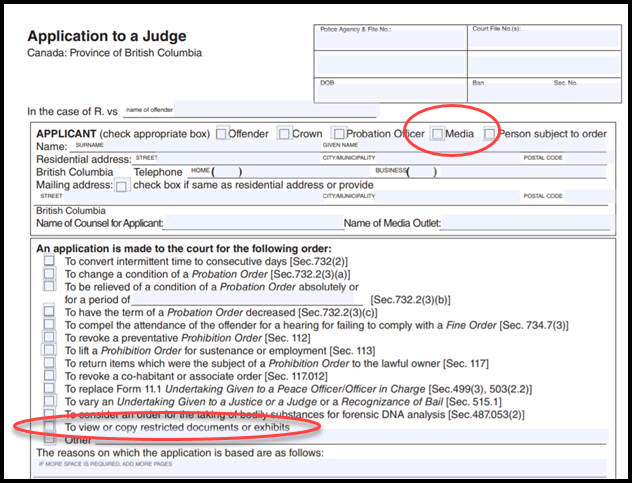The BC Provincial Court’s Access to Court Records Policy sets out who has access to which types of court records, in accordance with any laws that may apply. The Court’s policy establishes general guidelines governing access, but judges in individual cases decide issues concerning access when more specific direction is necessary.
When journalists are reporting on a trial, they may wish to get access to the exhibits that form part of the evidence in the trial. While there is unrestricted public access to many court documents, the policy restricts access to exhibits in a criminal trial to the Crown and defence lawyers and the accused person, “unless otherwise ordered by court upon application”.
Why does the public, including the media, need to make an application for access to exhibits in a criminal proceeding? The law requires judges to consider competing interests – on one hand freedom of expression and open courts, and on the other any danger that the ends of justice would be subverted by disclosure.
It is an established rule that Canadian courts are open to the public. Case law recognizes constitutional principles of freedom of expression and open courts as crucially important. Judicial decisions have also interpreted freedom of expression as protecting listeners as well as speakers. Thus, listeners and readers, as members of the public, have a right to information about public institutions - particularly the courts.
However, every court has a supervisory and protecting power over its own records. When exercising that power courts apply a presumption favouring public access - a person who would deny it bears the burden of proving that the ends of justice would be subverted by disclosure or that the judicial documents might be used for an improper purpose.
Curtailment of public access only occurs where there is a need to protect a social value of superordinate importance. For instance, BC and Canadian laws contain broad restrictions on access to court documents in matters involving youth in family and criminal proceedings to protect vulnerable children and youth.
The Provincial Court’s policy states that requests for access to exhibits should be made to the presiding judge if a case is pending or ongoing. If there is no judge seized of the matter, the application should be made to the Regional Administrative Judge of the Court in the location where the proceedings are or were held. Previously, the media used a general “Application to a Judge” form that really didn’t suit their applications for access to exhibits and restricted documents.

At the Court’s request, the Court Services Branch of the BC Ministry of the Attorney General has revised the form (PCR 315) to accommodate such applications by members of the media. In Section 1, “Media” has been added to the list of possible applicants. In Section 2, the option “To view or copy restricted documents or exhibits” has been added to the list of orders sought. And in Section 5 an option of “Third party notified” has been added to the list of orders the Court might make.
The Court hopes these changes to the “Application to a Judge” form used in criminal matters will help journalists by making it easier and quicker to fill out the form.
For more information see the BC Provincial Court Access to Court Records Policy and the “Application to a Judge” form (PCR 315), as well as the Media page of the Court’s website and the recently updated Provincial Court Media Guide.

